Have you ever wondered, can foreigners buy real estate in Bulgaria? The simple answer is yes! Bulgaria allows foreigners to purchase property, though certain restrictions exist, particularly when land is involved. The process often favors the purchase of apartments, which usually do not include land, ensuring a smoother transaction for non-residents. This makes the dream of owning a piece of Bulgarian real estate attainable even for international buyers. For those from the EU or EEA, and countries with specific agreements with Bulgaria, owning properties with land becomes feasible under less stringent conditions. This is particularly advantageous during times when housing prices, especially in cities like Sofia and popular resort towns, show significant but steady growth1. It’s essential to be aware that buying property here does not automatically grant residency, except under specific investment scenarios2. Let’s dive deeper into the realms of Bulgarian real estate ownership by non-residents and explore the unique opportunities it presents.
Key Takeaways: How to Buy a Property in Bulgaria
- Foreigners can buy real estate in Bulgaria, particularly apartments which do not come with land.
- EU/EEA nationals and those from specific agreement countries face fewer restrictions when purchasing properties that include land.
- Housing prices in Bulgaria vary, with cities like Sofia experiencing faster growth compared to rural areas1.
- Buying property in Bulgaria does not automatically grant residency except under special investment conditions2.
- With property prices in Bulgaria being among the lowest in the EU, it remains a great investment opportunity for foreigners12.
Contact us if you are Interested in Buying Property Abroad!
Overview of Bulgarian Property Market
The Bulgarian property market continues to offer enticing opportunities for foreign investors. With a year-on-year growth of +14% in the number of real estate transactions registered in Sofia in the first quarter of 2024, the market shows substantial progress3. Prices for two-room apartments in Sofia averaged 1433 EUR/sq.m, demonstrating a 7% increase from the previous year3. This growth signifies potential lucrative returns on investing in Bulgarian property as a non-citizen.
The impact of the 2008 financial crisis caused a price drop in Bulgarian properties by 40%, although the market has been gradually recovering4. However, investing in Bulgarian property as a non-citizen remains a viable option due to the appreciating property prices in major cities like Sofia, Varna, and Burgas. In these cities, housing price increases range from +5.3% to +17.3% in the fourth quarter of 2023 compared to the same period in 20223.
Current Trends and Opportunities
Recent trends indicate a growing interest in residential properties, especially among expat investors aiming for long-term stays or rental income. Coastal cities such as Varna and Burgas have witnessed an 18% increase in prices for two-room apartments, driven by their cultural appeal and resort areas3. Additionally, investing in apartments is more accessible as Bulgarian law allows foreign buyers to purchase without land restrictions5. The market’s promising trends reflect the benefits of purchasing real estate in Bulgaria as an expat.
Popular Locations for Foreign Buyers
Popular Bulgarian real estate destinations for foreigners include major urban centers and tourist hotspots. Sofia, known for its robust infrastructure and amenities, ranks high among expats. Cities such as Burgas and Varna, renowned for their coastal attractions, appeal to those interested in vacation homes and rental properties. The appreciation in property values in these cities underscores their desirability3. Furthermore, EU and EEA citizens can purchase houses with gardens in specific areas, enhancing the appeal of purchasing real estate in Bulgaria as an expat5.
Can Foreigners buy Real Estate in Bulgaria?
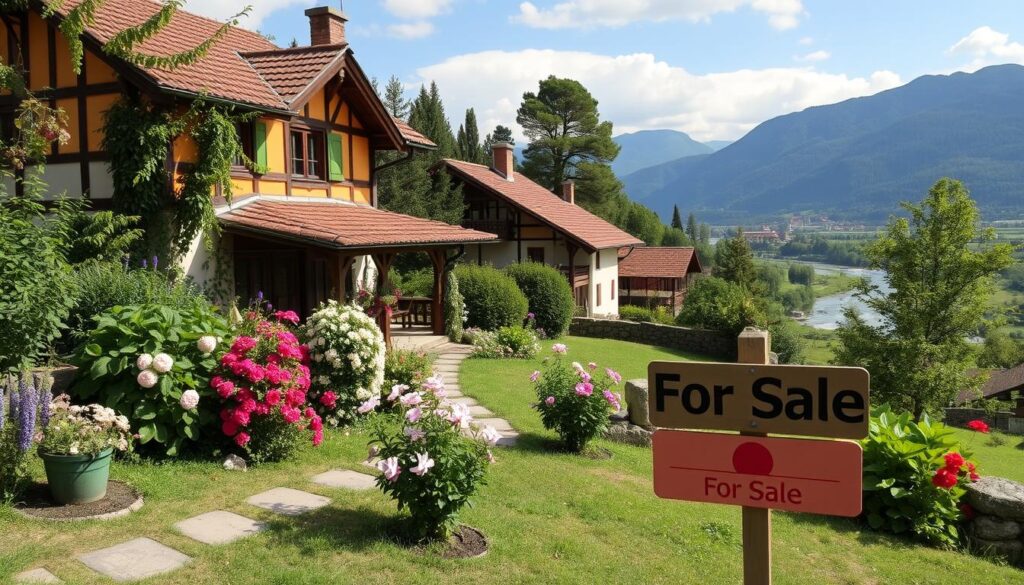
Foreigners are indeed allowed to buy real estate in Bulgaria. They can purchase apartments, full buildings, and office premises with ease. However, there are specific non-resident property ownership rules in Bulgaria that limit foreigners from directly owning private houses, villas, and land plots. To circumvent these restrictions, non-EU/EEA nationals can form a registered Bulgarian company, enabling them to own land indirectly6.
The extensive portfolio provided by property agencies, like PROPERTY.BG, spans over 30,000 Bulgarian properties including residential, commercial, and land sectors. Established for 17 years, this agency focuses on offering services tailored to foreign buyers and investors in Bulgaria6. Furthermore, non-resident property ownership rules in Bulgaria ensure that foreign companies face no restrictions when acquiring real estate through lending mechanisms like this process6.
Properties in Bulgarian cities exhibit varying prices per square meter, influenced by their location. For instance, Sofia offers property prices ranging between 1,500 to 3,500 BGN per square meter, whereas in Plovdiv, a city with a population of around 350,000, the prices are from 1,200 to 2,800 BGN per square meter7. Despite these fluctuations, buying property in Bulgaria as a foreigner is facilitated by the transparent registration in the Land Register, ensuring ownership is publicly accessible and documented6.
Understanding the non-resident property ownership rules in Bulgaria is crucial for foreign investors. While the ownership of apartments and commercial properties is straightforward, prospective buyers must be mindful of the restrictions concerning land and private houses. This setup encourages many non-EU/EEA nationals to establish Bulgarian companies to streamline their property ownership.
The dynamic growth of housing prices in Bulgaria, particularly in cities like Sofia and resort towns, underscores the country’s appealing real estate market1. However, for a hassle-free transaction, it is vital to work with certified agencies to navigate the complex local legislation, as well as language and procedural challenges.
Legal Requirements for Foreigners Buying Property in Bulgaria
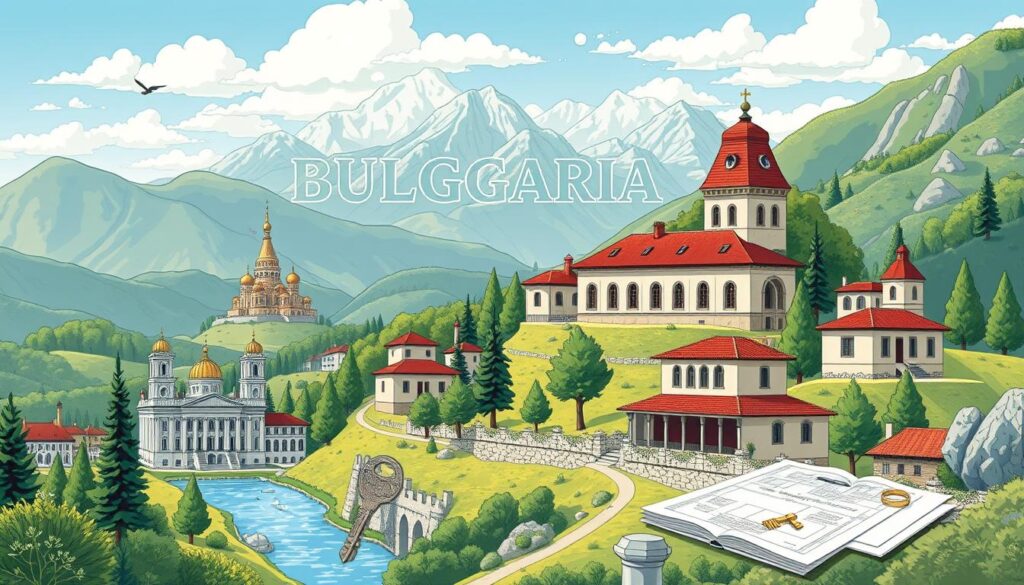
The process for acquiring property as a foreigner in Bulgaria entails specific requirements that differ based on one’s citizenship. Understanding these requirements is crucial for a smooth transaction and successful long-term investment.
Non-EU/EEA Nationals
Non-EU/EEA nationals face certain restrictions when purchasing land directly in Bulgaria. One common method to bypass this restriction is to set up a Bulgarian company which can legally own land. This approach allows foreigners to invest in real estate by establishing a legal entity within Bulgaria. This method, although practical, requires awareness of Bulgaria real estate investment laws for non-citizens. Engaging a trusted local lawyer or real estate agency, which often provides services such as property inspection and legal document verification, is highly recommended to ensure secure transactions8. Moreover, foreigners must adhere to the requirements for foreigners buying property in Bulgaria, including the obligatory property transfer tax of 3% of the property’s assessed value8.
Additionally, foreign buyers are subject to a VAT rate of 20% on the price of acquired residential property, and a stamp duty of 0.1% is needed during the registration of property rights at the Bulgarian Registry Agency8. These financial considerations are crucial for non-EU/EEA nationals to budget for when planning their real estate investments. More information about property purchase regulations for non-citizens can be found here.
EU/EEA Citizens
For EU/EEA citizens, the process is notably simpler. They have the right to acquire the ownership of land and buildings in Bulgaria in accordance with legal requirements. This ease of acquisition reflects the harmonized laws within the EU. Compliance with the Law on Foreigners in the Republic of Bulgaria is still necessary, but EU/EEA nationals generally enjoy more relaxed regulations compared to non-EU/EEA citizens9. Supporting documents such as proof of ownership, property location papers, tax assessment, and certificates of no encumbrances must be provided to ensure the legality of the purchase9.
Whether from within or outside the EU/EEA, all foreign property buyers must be aware of Bulgaria real estate investment laws for non-citizens. Moreover, long-term residency linked to real estate investments requires a minimum investment of BGN 600,000. Documentation proving investment and ownership, as well as compliance with residency laws, is necessary for visa applications for long-term stays.
By understanding and navigating the various legal requirements for foreigners buying property in Bulgaria, potential buyers can better prepare for a successful property acquisition, ensuring all necessary steps and regulations are met efficiently.
Types of Properties Available for Foreign Buyers in Bulgaria
Foreign investors eyeing the Bulgarian real estate market will find a variety of property types suited to different needs and preferences. The process and prerequisites for acquiring properties vary based on the types of Bulgarian real estate for foreigners, but significant opportunities abound for those willing to navigate the regulations.
Purchasing Apartments
Apartments in Bulgaria for nonresidents present a popular option, mainly because they can be bought without the complications associated with land ownership. Notably, the real estate market in Bulgaria is among the cheapest in the region, making it particularly attractive for investors (more details here)10. Foreign buyers can freely purchase apartments and similar buildings such as offices and shops, with fewer legal hurdles11. Additionally, average property prices in Sofia are over 1,000 euros per square meter, while properties in villages around Sofia typically range from 250 to 450 euros per square meter12.
Buying Houses with Land
Purchasing land in Bulgaria as an expat is achievable though more complex due to legislative conditions. Foreigners can buy houses without land directly, but when it comes to obtaining properties with land, certain criteria must be met. For EU/EEA nationals and citizens of countries with bilateral agreements with Bulgaria, buying houses with land is manageable11. Others must establish a Bulgarian company to hold the title to the land, a process that may cost from as low as 2 BGN to between 400 and 1000 EUR via a solicitor, and usually takes a few days to complete10. Furthermore, European Union citizens can acquire land for purposes such as a second home, agriculture, or forestry11.
Step-by-Step Guide to Buying Property in Bulgaria
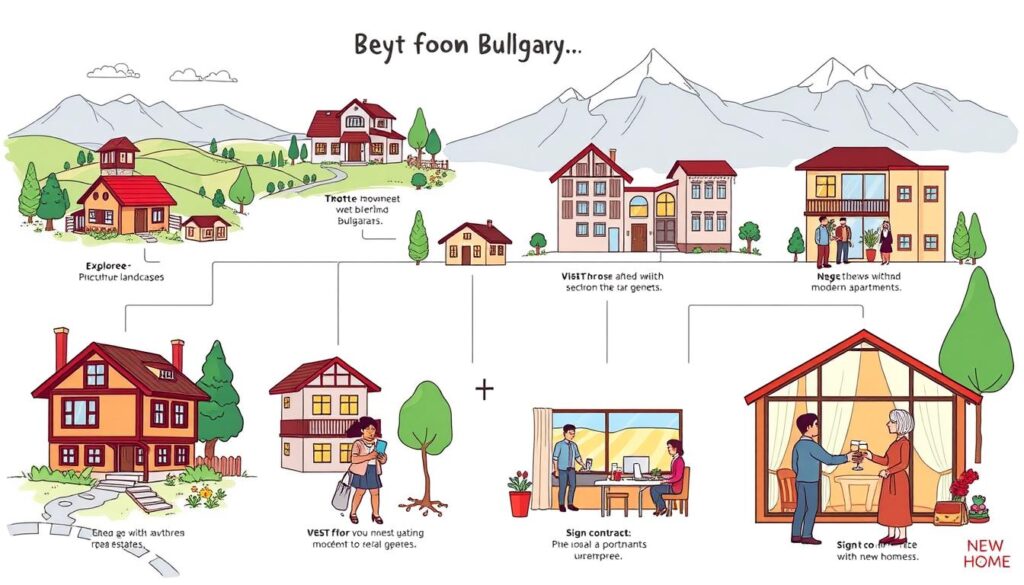
The Bulgarian property purchase process is designed to be straightforward and transparent, ensuring buyers can navigate each step with confidence. This guide to buying property in Bulgaria breaks down the entire process to help you make a smooth real estate acquisition.
Initial Search and Property Selection
To begin, potential buyers should conduct an initial search to identify properties that meet their criteria. Agencies like “Bulgaria House” offer a wide selection of properties, considering buyers’ needs and investment preferences13. Popular destinations for purchasing property in Bulgaria include Burgas, Nessebar, Varna, Sunny Beach, and Sveti Vlas13. Ownership verification and title searches are essential steps during this phase to ensure the property is free of any legal encumbrances14.
Payment of Deposit and Preliminary Agreement
Once a property is selected, the next step involves paying a deposit, typically around 2,000 EUR, to reserve it5. This payment is followed by signing a preliminary agreement with the property owner, usually within 30 days of the deposit5. This preliminary agreement outlines the terms and conditions of the sale, ensuring both parties are in mutual understanding of the transaction.
Notary Deed and Final Purchase
The final step in the step-by-step real estate acquisition in Bulgaria is the execution of the notary deed. This crucial document, signed in the presence of both the buyer and seller, certifies the legal ownership transfer5. The notary deed is registered with the Registry Agency, which formalizes the transfer to the buyer5. Buyers are required to transfer the full payment into a Bulgarian bank account to complete the purchasing process legally. Engaging a real estate agent can further streamline the Bulgarian property purchase process, making it hassle-free and ensuring all legalities are properly addressed14.
This comprehensive approach, coupled with understanding the associated costs like notary fees, transfer taxes, and stamp duty14, ensures that the guide to buying property in Bulgaria is both thorough and efficient. Be aware of annual property taxes and maintenance fees required in gated developments to avoid any surprises post-purchase5.
Contact us if you are Interested in Buying Property Abroad!
Taxes and Fees Related to Property Purchase in Bulgaria
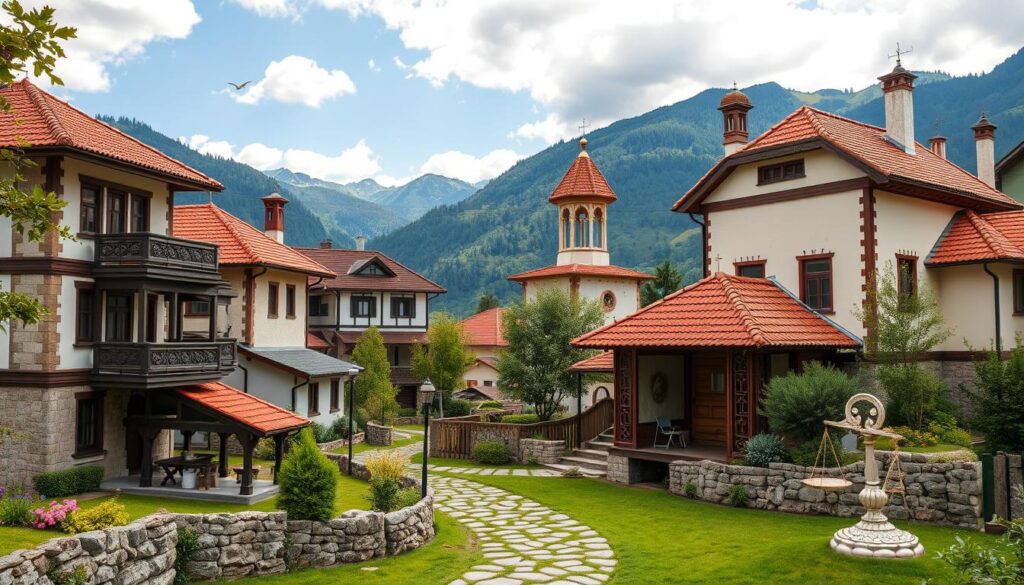
When purchasing real estate in Bulgaria, comprehending the associated taxes and fees is essential. The primary costs include notary fees, property purchase taxes, and annual property maintenance expenses. Below are the detailed sections outlining each.
Notary Fees
Bulgarian property transactions necessitate the engagement of a notary, who facilitates the legalities of the process. Notary fees in Bulgaria range between 0.1%-1% of the property’s value, with a maximum cap at BGN 6000 (approximately EUR 3000)15. Additionally, a 20% VAT is applied on top of the notary fees16. Notaries often provide supplementary services such as property checks, drafting deeds, and managing escrow accounts16. To summarize:
| Service | Fee |
|---|---|
| Notary Fee | 0.1% – 1% of property value (max BGN 6000) |
| VAT on Notary Fee | 20% |
| Additional Notary Services | Variable |
Property Taxes
Bulgarian property purchase taxes are determined by the local Municipality and range from 0.1% to 3% of the higher value between the tax assessment and purchase price15. In Sofia, for example, the rate is set at 3%15. Additionally, registering a real estate transaction incurs a fee of 0.1% of the property’s value15. Below is a summary:
| Tax Type | Rate |
|---|---|
| Property Purchase Tax | 0.1% – 3% (depending on Municipality) |
| Registration Fee | 0.1% of purchase price |
Annual Property Maintenance
Owning property in Bulgaria incurs annual costs, including property taxes and waste management fees, based on the property’s tax evaluation as determined by the Municipality15. These annual costs of owning property in Bulgaria can often be shifted contractually to tenants or occupants15. Property owners must be aware of regional variations in rates and possible contractual obligations that might affect these expenses. Here is a brief overview:
| Maintenance Cost Type | Detail |
|---|---|
| Annual Property Tax | Varies by region |
| Waste Management Fees | Based on tax evaluation |
Financing Options for Foreign Property Buyers
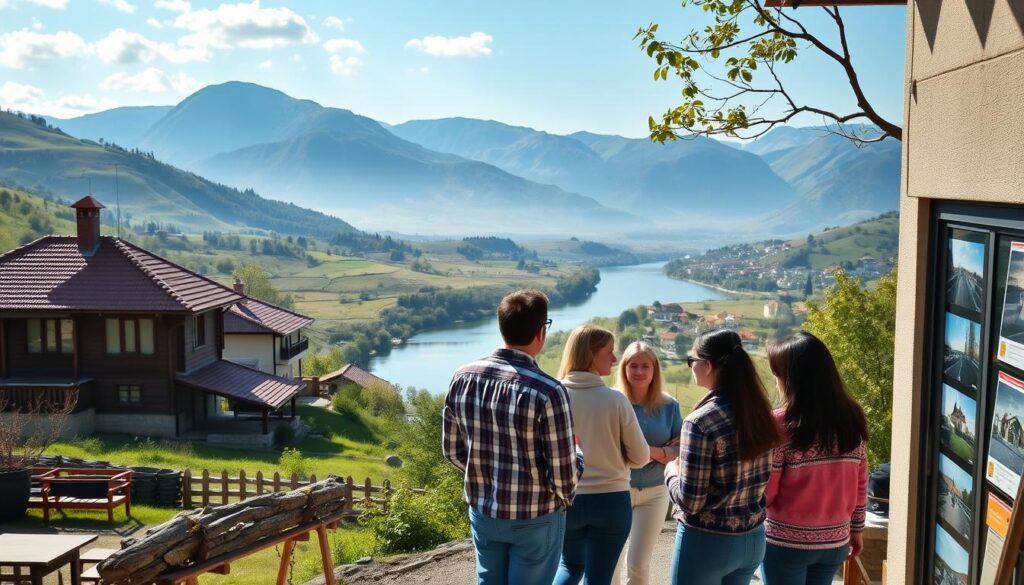
When it comes to financing real estate in Bulgaria, foreign buyers have several options to consider, including personal funding and mortgage options.
Using Personal Funds
One of the simplest ways to finance a property purchase in Bulgaria is through personal funding for property investment in Bulgaria. This approach involves using your own savings or investment capital to cover the purchase price and any associated costs. Buyers should account for additional costs such as notary fees, which are approximately 1% of the property price, and annual property tax, ranging from 70-100 euros17.
Moreover, investing personal funds can streamline the purchasing process and eliminate the complexities of securing a mortgage. However, it’s essential to manage these funds efficiently to optimize tax benefits and meet financial goals.
Mortgage Options in Bulgaria
For those considering mortgage options for expats in Bulgaria, local banks provide several attractive opportunities. Buyers can avail of mortgage loans up to EUR 250,000, with a maximum term of 25 years, and interest rates ranging from 6.25% to 14%18. The maximum financing percentage often reaches up to 80% of the market valuation for fully completed properties and up to 70% for those under construction18. Applicants are typically required to be under 65 years old and must present sufficient collateral, usually a first-ranking mortgage on the property18.
Additionally, loans are available in EUR, and the required own funds depend on the completion status of the property, with a minimum of 20% needed8. Notably, fees and commissions may vary among different banks, and applicants may need to arrange for property and life insurance in favor of the bank according to its requirements18. Thorough financial planning and understanding these terms can help foreign buyers make informed decisions when securing mortgage options for expats in Bulgaria.
Residency and Immigration Implications of Property Purchase
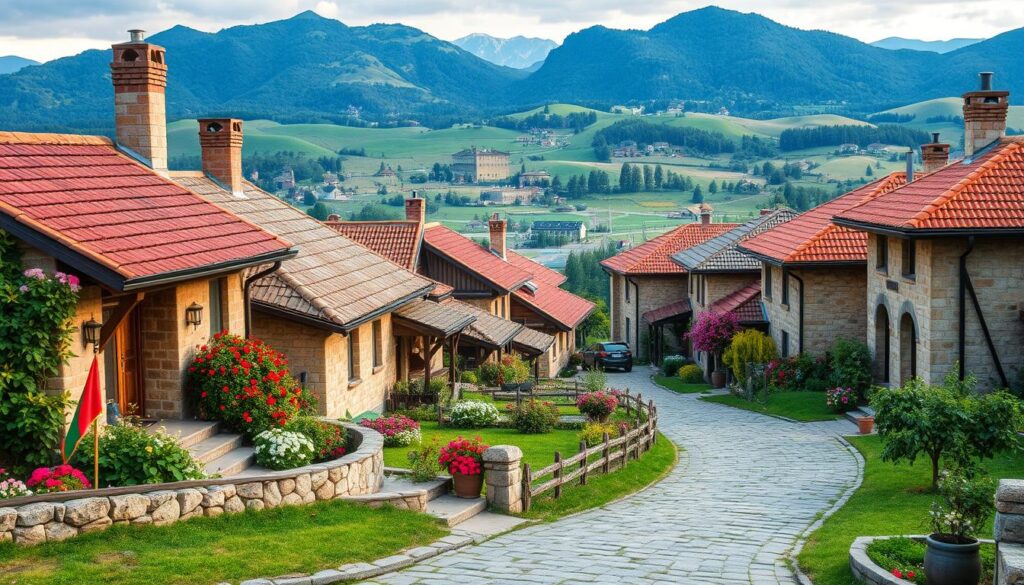
One of the significant considerations for foreign investors in Bulgarian real estate and residency is the potential pathway to residency that property investment can provide. Additionally, understanding the specific visa requirements for property buyers is critical to ensuring a smooth process.
Visa Requirements for Property Buyers
Foreign nationals, particularly from non-EU/EEA countries, looking to invest in Bulgarian real estate and residency need to apply for a type D visa initially. This visa is crucial to start the process towards obtaining an extended residence permit. The type D visa allows for a stay of up to six months, providing the necessary time to finalize property purchase and complete other residency formalities19. British nationals, post-Brexit, must also follow this requirement to stay in Bulgaria for over three months19.
Pathway to Extended Residence Permit
Purchasing Bulgarian real estate valued at BGN 600,000 or more can facilitate obtaining an extended residence permit20. This extended permit is the first step toward more permanent residency options. After five years of holding consecutive long-term residence permits, non-EU/EEA nationals can apply for a permanent residence permit19. This pathway underscores the immigration implications of owning property in Bulgaria, as it provides a structured route for foreigners looking to establish long-term residency in the country.
It’s essential to ensure all eligibility requirements are met and documents properly verified to prevent any legal complications during the long-term residence application process19. Understanding these immigration implications of owning property in Bulgaria can significantly benefit prospective investors aiming for residency.
Common Challenges and Pitfalls to Avoid
When considering buying real estate in Bulgaria, it’s crucial to navigate several challenges to ensure a successful investment. One major pitfall is falling for seemingly low property prices without assessing the actual value. Many foreign investors have made mistakes, leading to financial losses, with statistics showing that 90% face pitfalls in the real estate market21. Additionally, because of Bulgaria’s less transparent property buying process, scams were highly prevalent during the mid-2000s property boom21.
Understanding the legal landscape is paramount. Foreign buyers often encounter legal complexities, particularly concerning land ownership, which can cause significant delays. A notable case from 2012 involved a British couple who struggled with the legal nuances in Bulgaria’s property market, highlighting potential hurdles21. Hence, it is prudent to seek advice from reputable real estate agents and legal professionals to avoid these complications.
Maintenance fees and property rights, especially in heritage zones like Nessebar, can also be unforeseen hurdles for foreign investors. The prevalence of these issues shows the importance of thorough due diligence21. Moreover, unrealistic expectations and lack of proper market research can lead to financial setbacks. For instance, 100% of investors who lost money in Bulgaria spent less than an hour researching the market21. Consequently, it is essential to put in ample time to understand the market thoroughly before making investments.
Another significant concern involves discrepancies between the physical property and its cadastral map representation, which can be especially problematic in rural areas or with older properties21. Thus, ensuring accurate property documentation is vital. To gain more insights and avoid these common challenges, consider reading detailed guides like this one from a reliable source.
Contact us if you are Interested in Buying Property Abroad!
FAQ
Can Foreigners buy Real Estate in Bulgaria?
Yes, foreigners are allowed to buy property in Bulgaria. While non-EU/EEA nationals face restrictions on purchasing land directly, they can own land through a registered Bulgarian company. EU/EEA citizens enjoy more freedom in acquiring properties with land.
What are the current trends and opportunities in the Bulgarian property market?
The Bulgarian property market is thriving with interest in residential properties. Major cities and tourist destinations like Sofia, Plovdiv, and Coastal Black Sea areas are popular among foreign investors for rental income and vacation homes.
Are there specific rules for non-residents buying property in Bulgaria?
Yes, non-residents need to comply with Bulgaria’s property laws. For non-EU/EEA nationals, purchasing land requires setting up a Bulgarian company. They can freely buy apartments and full buildings without land restrictions.
What are the legal requirements for foreigners buying property in Bulgaria?
Foreign buyers must ensure due diligence, including verifying property documents and compliance with Bulgarian property laws. Non-EU/EEA nationals must establish a Bulgarian company to purchase land, whereas EU/EEA citizens can buy land directly.
Can foreigners purchase apartments in Bulgaria?
Absolutely, apartments are a popular choice for foreigners as they generally do not come with land, making the purchase process simpler. This avoids the land ownership restrictions applied to non-EU/EEA nationals.
How can foreigners buy houses with land in Bulgaria?
EU/EEA nationals can buy houses with land directly. Non-EU/EEA nationals must set up a Bulgarian company to purchase land. This enables them to own properties like houses with gardens or regulated plots of land.
What is the step-by-step process to buying property in Bulgaria?
The steps include selecting the property, paying a deposit to reserve it, signing a preliminary agreement, and finalizing the sale with a notary deed. Ensuring transparency and transferring payment through a Bulgarian bank account is vital.
What taxes and fees are involved in property purchases in Bulgaria?
Costs include notary fees, property taxes based on purchase price or tax assessment, and registration fees. Property ownership entails annual property taxes and waste management fees, with additional maintenance fees in gated communities.
What financing options are available for foreign property buyers in Bulgaria?
Foreigners can use personal funds or mortgage options from Bulgarian banks. There are no restrictions on obtaining loans, and careful financial planning is essential to optimize tax benefits, especially for significant investments meeting specific criteria.
What are the residency implications of buying property in Bulgaria?
Foreign property buyers need a type D visa for long-term residency applications. Investment in real estate valued at BGN 600,000 or more can lead to an extended residence permit, with permanent residency possible after five years of continuous stay.
What challenges and pitfalls should foreign buyers be aware of?
Challenges include navigating legal restrictions on land ownership, understanding taxes, and compliance with legal requirements. Due diligence and collaboration with reputable real estate agents and legal professionals are crucial to safeguarding investments.
Source Links
- https://bulgarianresales.com/en/a-comprehensive-guide-to-buying-a-house-in-bulgaria-what-you-need-to-know
- https://wise.com/gb/blog/buying-property-in-bulgaria
- https://realting.com/news/a-detailed-guide-on-how-to-buy-property-in-bulgaria
- https://en.bolgarskiydom.com/nedvijimost_plyusyi_i_minusyi/
- https://www.bulgarianproperties.com/property-buying-procedure.htm
- https://www.property.bg/
- https://investropa.com/blogs/news/bulgaria-real-estate-foreigner
- https://bolgariadom.com/en/purchasing-real-estate-in-bulgaria-step-by-step-plan-for-foreigners
- https://advokatilieva.com/buying-property-in-bulgaria-as-a-foreigner
- https://www.bestbgproperties.com/article/buy_land_bulgaria.html
- https://refugeelight.bg/en/buying-property-car-BG
- https://www.move2bulgaria.com/property-in-bulgaria/
- https://bolgariadom.com/en/buying-home-in-bulgaria-step-by-step-guide-for-foreign-investors
- https://innovires.com/a-step-by-step-guide-to-buying-property-in-bulgaria/
- https://multilaw.com/Multilaw/Multilaw/RealEstate/Real_Estate_Guide_Bulgaria.aspx
- https://trifonov.info/en/property-purchase-tax/
- https://bolgariadom.com/en/buying-apartment-in-bulgaria-tips-for-foreign-investors
- https://en.buyinbg.com/services/mortgages/
- https://www.gov.uk/guidance/how-to-buy-property-in-bulgaria
- https://businesslawyersbulgaria.com/en/acquisition_of_a_real_estate_in_bulgaria-1240.html
- https://investropa.com/blogs/news/bulgaria-property-pitfalls

Comments